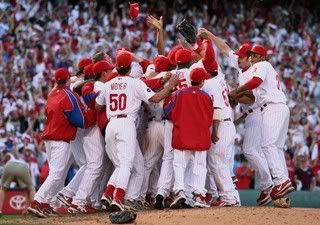Post by WVUfanPHILLY on Aug 13, 2007 11:11:46 GMT -5
By Bob Hertzel
For the Times West Virginian
MORGANTOWN — Rich Rodriguez has worries of his own these days. Two of his West Virginia University players, including starting linebacker Marc Magro, have or have just gotten through mononucleosis. There are others who are trying to get through the aches and sprains that come with preseason camp.
One of those players is Patrick White, his magnificent quarterback, who runs through a litany of ailments from ankle to groin to back when asked about his health.
It is easy for a coach or a player to believe that no one in the world has the problems he has.
That’s why it was important for Cisco Jeter to roll into the Puskar Center the other day.
In one way, he was like so many other pharmaceutical pushers who come through the automatic doors of the Milan Puskar Center. He had a product to sell, an anti-bacterial spray used in the locker room and weight room, as well as on the artificial surface of Mountaineer Field, to cut down on the chances of players contracting mono or the feared MRSA, a feared staph infection that is highly contagious.
“You get an outbreak of MRSA and it will ruin you, just ruin you, let alone the health of your young men,” Rodriguez said.
But Jeter was different than any other pharmaceutical salesman to come through that door, for he brought with him not only a product to sell but a story to tell.
You’ll have to forgive him if he told it to the West Virginia players while sitting down.
He is a paraplegic.
His story begins at what seemed like the end, really.
The year was 1988 and Jeter, then 20, was a kid who had it all.
Strength, speed with a personality and a smile that lit up the entire Salem University campus, where he started on the football team as a true freshman.
The first week of the fall he had gone back home to suburban Washington, D.C., and was returning to campus on I-68 when there was the squeal of brakes, a sound of breaking glass, the smell of burning rubber.
The kid who had it all suddenly had nothing.
The phone call to his coach at Salem came not long after the accident.
“It was one of those calls you dread,” Rich Rodriguez said.
He was the youngest head coach in the nation, about to embark upon his only season as head coach at Salem, a season that started in hell and ended with the sport being dropped.
“I went over and met him at the hospital,” Rodriguez recalled after Jeter had left the Puskar Center to await a decision on whether or not his spray would be purchased.
“What do you say? I’m only 24 then. I didn’t know what to say.”
Indeed, what do you say to a young athlete who no longer has any hope of moving? How do you console him? How can you console him?
“The doctors had already told him. Here’s a young man, one of the best athletes on the team, could run all day — now he’s going to be paralyzed for life,” Rodriguez continued.
He remembers standing there by the gurney on which they had Jeter, about to roll him into surgery.
“Cisco, I’m sorry. I don’t know what to say. I know the doctor talked to you,” were the words that came out Rodriguez’s mouth.
“I’m sorry.” That was pretty much all Rodriguez could say. It was the response that made the moment what it was.
“He looked at me and said, ‘Coach, I’ll be all right.’ He had that big smile on his face. Then he said to me, ‘I’ll be in the Wheelchair Olympics in four years.’”
Rodriguez knew right then that this was special person.
“It floored me. I couldn’t believe it. And, know what? In four years, he was one of the nation’s best and was in the Olympics,” Rodriguez said.
Not just in the Olympics. He became a champion.
In the 1992 Paralympics in Barcelona he won a gold medal in the 4x100 relay and a bronze in the 800 meters. He added to that four years later in Atlanta.
“The Paralympics, to me, means overcoming adversity,” Jeter said at the time. “It means doing your best among elite competition. To be out there performing before a packed stadium is a great thrill, the same as it is for the Olympic athletes.
“To compete in the Paralympics means you are one of the best in the world in your event. We do not want sympathy. We just want to be recognized for the things we can do, the same as Carl Lewis does or Florence Torrence or Flo-Jo. The meaning is the same.”
It is a strong message, one Rodriguez would not slip past his team. He brought Jeter before them to speak briefly, but effectively.
You knew those muscle aches and ankle sprains hurt a whole lot less when he finished his presentation.
That was certainly true with Patrick White.
“I was thinking I’m blessed,” White said. “My dad is always telling me how blessed I am. Seeing him and hearing his story definitely makes you want to work hard. He could have been down and out. After that, I don’t do too much complaining.”
For the Times West Virginian
MORGANTOWN — Rich Rodriguez has worries of his own these days. Two of his West Virginia University players, including starting linebacker Marc Magro, have or have just gotten through mononucleosis. There are others who are trying to get through the aches and sprains that come with preseason camp.
One of those players is Patrick White, his magnificent quarterback, who runs through a litany of ailments from ankle to groin to back when asked about his health.
It is easy for a coach or a player to believe that no one in the world has the problems he has.
That’s why it was important for Cisco Jeter to roll into the Puskar Center the other day.
In one way, he was like so many other pharmaceutical pushers who come through the automatic doors of the Milan Puskar Center. He had a product to sell, an anti-bacterial spray used in the locker room and weight room, as well as on the artificial surface of Mountaineer Field, to cut down on the chances of players contracting mono or the feared MRSA, a feared staph infection that is highly contagious.
“You get an outbreak of MRSA and it will ruin you, just ruin you, let alone the health of your young men,” Rodriguez said.
But Jeter was different than any other pharmaceutical salesman to come through that door, for he brought with him not only a product to sell but a story to tell.
You’ll have to forgive him if he told it to the West Virginia players while sitting down.
He is a paraplegic.
His story begins at what seemed like the end, really.
The year was 1988 and Jeter, then 20, was a kid who had it all.
Strength, speed with a personality and a smile that lit up the entire Salem University campus, where he started on the football team as a true freshman.
The first week of the fall he had gone back home to suburban Washington, D.C., and was returning to campus on I-68 when there was the squeal of brakes, a sound of breaking glass, the smell of burning rubber.
The kid who had it all suddenly had nothing.
The phone call to his coach at Salem came not long after the accident.
“It was one of those calls you dread,” Rich Rodriguez said.
He was the youngest head coach in the nation, about to embark upon his only season as head coach at Salem, a season that started in hell and ended with the sport being dropped.
“I went over and met him at the hospital,” Rodriguez recalled after Jeter had left the Puskar Center to await a decision on whether or not his spray would be purchased.
“What do you say? I’m only 24 then. I didn’t know what to say.”
Indeed, what do you say to a young athlete who no longer has any hope of moving? How do you console him? How can you console him?
“The doctors had already told him. Here’s a young man, one of the best athletes on the team, could run all day — now he’s going to be paralyzed for life,” Rodriguez continued.
He remembers standing there by the gurney on which they had Jeter, about to roll him into surgery.
“Cisco, I’m sorry. I don’t know what to say. I know the doctor talked to you,” were the words that came out Rodriguez’s mouth.
“I’m sorry.” That was pretty much all Rodriguez could say. It was the response that made the moment what it was.
“He looked at me and said, ‘Coach, I’ll be all right.’ He had that big smile on his face. Then he said to me, ‘I’ll be in the Wheelchair Olympics in four years.’”
Rodriguez knew right then that this was special person.
“It floored me. I couldn’t believe it. And, know what? In four years, he was one of the nation’s best and was in the Olympics,” Rodriguez said.
Not just in the Olympics. He became a champion.
In the 1992 Paralympics in Barcelona he won a gold medal in the 4x100 relay and a bronze in the 800 meters. He added to that four years later in Atlanta.
“The Paralympics, to me, means overcoming adversity,” Jeter said at the time. “It means doing your best among elite competition. To be out there performing before a packed stadium is a great thrill, the same as it is for the Olympic athletes.
“To compete in the Paralympics means you are one of the best in the world in your event. We do not want sympathy. We just want to be recognized for the things we can do, the same as Carl Lewis does or Florence Torrence or Flo-Jo. The meaning is the same.”
It is a strong message, one Rodriguez would not slip past his team. He brought Jeter before them to speak briefly, but effectively.
You knew those muscle aches and ankle sprains hurt a whole lot less when he finished his presentation.
That was certainly true with Patrick White.
“I was thinking I’m blessed,” White said. “My dad is always telling me how blessed I am. Seeing him and hearing his story definitely makes you want to work hard. He could have been down and out. After that, I don’t do too much complaining.”




